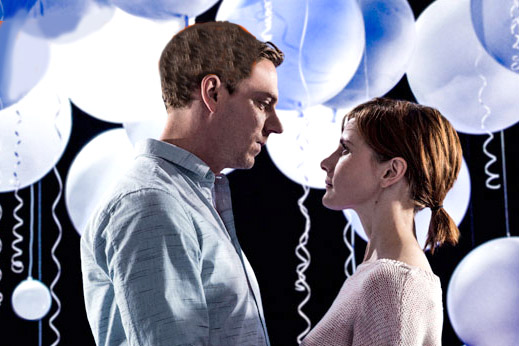 Nick Payne’s inventive Constellations is about the relationship of Roland (Joe Armstrong) and Marianne (Louise Breadley) but it’s not exactly a love-story. With its themes of multiverse theory, chance encounters and the absence of human free will, it almost seems like a stance against romance – the word ‘love’ is not so much as uttered – but at the same time it is beautiful and frank in its portrayal of relationships and its exploration of decisions and chance.
Nick Payne’s inventive Constellations is about the relationship of Roland (Joe Armstrong) and Marianne (Louise Breadley) but it’s not exactly a love-story. With its themes of multiverse theory, chance encounters and the absence of human free will, it almost seems like a stance against romance – the word ‘love’ is not so much as uttered – but at the same time it is beautiful and frank in its portrayal of relationships and its exploration of decisions and chance.
It’s unlike any play you’re likely to have seen before. There are no scenes or set changes, and no distinctive or tangible narrative to be followed. The set and staging is simple, and the tech is extraordinary; the only constants in this piece are the couple who never once leave the stage and the bouquet of nightmarish white balloons which surround them throughout, hovering just above their heads and pulsating with light. This is a two-hander set with an infinite amount of settings. A piece of forum theatre where the writer’s already done the work . . .
Marianne meets Roland at a barbeque; she flirts with him but realises he has a girlfriend. Mariane meets Roland at a barbecue; she flirts with him but realises he’s married. Marianne meets Roland at a barbecue; he flirts with her but she’s not interested…. The same scenes play out over and over, but with different decisions and random factors at work each time. Sometimes they play out very differently. Sometimes we’re looking for the subtle changes within the moods, language and relationship. Both the repetition and surprises within each fragment is a great source of much of the show’s humour, and there is some fantastically sweet and idiosyncratic writing which at times brings much-needed relief to the darker moments in the play.
Armstrong and Breadly give incredible performances in roles which require immense fluidity and fast-paced changes. Breadly in particular is so well-rounded as the anxious, intelligent Marianne that she almost becomes the narrative itself. We watch her progress, regress and digress throughout a turbulent life and love – and she is always truthful and riveting to watch. Armstrong is also fantastic as the very sweet, practical and slightly naïve Roland. He, whilst trying to understand the meaning of life, is still holding on to ideas of courtship, romance and order. Marianne, on the other hand, is full of uncertainty about everything except uncertainty. Both are very natural in their roles and demonstrate a warm genuine compassion towards one another. And though it is unclear how their relation actually develops, their friendship at all times shines through with the distinct glimmer of truth.
Truth is the key feature of the play; it is tangible, relatable and honest, even as it takes us through some boggling ideas about infinity and choice. The surrounding balloons burst with light, and are accompanied by sudden rushes of noise and distortion as we are shown “an unimaginably vast ensemble of parallel universes.” But it always comes back the finite and tangible. String theory and free will is blended with ballroom dancing lessons, bee-keeping and soggy sausages.
Exactly as theatre should be, Constellations is vivid, honest and electrifying. It excites the imagination and enflames debate. It strips away and remoulds the narrative structure in order to create a spectacle that makes us question the very nature of our reality. It shows us a world of infinite possibilities and inevitable truths as it leads us through some dark, uncomfortable routes, and still it should leave you feeling warmed, positive and inspired (if you ignore the more frightening implications of having no free will). ★★★★☆ Chris White 28/05/15

